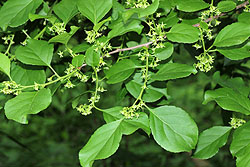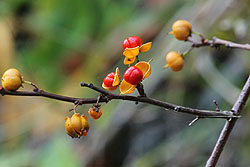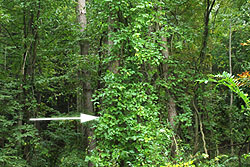|
|
||
| x Figure A. View of service road, where the service road and rim trail overlap. |
|
. |
||||
| . . |
Home | Ecology Main | Documentation | . |
| . Plant Ecology of the Area Surveyed Rim Trail - Disturbed Service Road . |
||||
|
|
||
| x Figure A. View of service road, where the service road and rim trail overlap. |
| This
portion of the rim trail overlaps with the service road for more or less
100 yards. The service road
offers park maintenance personnel a way to travel between the lower and
upper portions of the state park. As the above image indicates,
the road is unimproved, its surface consisting of packed gravel and
stones. In
recent times, the service road is seldom used by vehicles other than
tractor mowers in those sections where grasses provide the cover. Evidently, this section of the rim trail is a human-disturbed site. The terrain to the east-northeast of the road rises gently upwards. The land to the west-northwest slopes more steeply downwards. Thus, drainage is good. The dry-mesic ground and relatively ample sunlight provide excellent conditions for higher plant diversity. But it does tend to become "weedy" here. By comparison with the
oak-hemlock forest
higher on the hill, no small set of tree species dominates the margins
of the trail here, and no small group of understory plants is
prevalent. The most common shrubs here are non-natives, such as
Morrow's honeysuckle*, privets and autumn olive. The herbaceous
plant community is a virtual "melting pot" of native and
non-native species, with no one species being especially common. |
 |
 |
 |
| Figure B. Oriental bittersweet (Celastrus orbiculatus). Left: flowers & leaves. Center: fruit. Right: climbing habit. | ||
| However,
oriental bittersweet, a highly invasive, woody vine, is becoming worrisome.
Bittersweet is rampant in both wooded and open
tracts to the east-northeast of this section of the rim trail, and it is
becoming alarmingly established on the wooded slope downhill of this
section of the trail. If not managed, this pest will dramatically
alter the appearance of the service road/ rim trail in the future.
Below, a detailed
image of some of the understory plants in this section of the rim trail. |
|
|
||
| Figure C. Ebony spleenwort fern*, marginal woodfern, black birch, Morrow's honeysuckle, thimbleweed, etc. | ||
|
* To convert English plant names to their scientific equivalents, click this link. |
.
|
. |
.